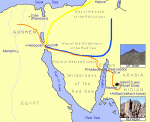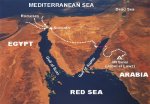the Book of Numbers, and the other version being slotted around the Marah narrative and around other narratives in the Book of Exodus and Book of Numbers, as appropriate;[SUP][13][/SUP] according to this view, the latter version of this list would originally have read ...and they went out into the wilderness of Shur; and they went three days in the wilderness, and found no water, then they came to Elim, where were twelve wells of water, ..., without mentioning Marah.[SUP][13][/SUP]
The exact location of Marah is uncertain, as are the positions of Etham, Shur, and Elim; the identification of these locations is heavily dependent on the identification of the Biblical Mount Sinai. Traditionally, Sinai was equated with one of the mountains at the south of the Sinai Peninsula leading to the identification of Marah as Ain Hawarah, a salty spring roughly 47 miles southeast fromSuez.[SUP][8][/SUP] However, the majority of both scholars and religious authorities believe that this traditional identification of Sinai is inaccurate, with the suggested alternatives being in the north and centre of the Sinai peninsula, in the Hejaz, and in the north eastern Arabah; Marah (Bible) - Wikipedia, the free encyclopedia
The Dead Sea (Arabic: البحر الميت
 al-Baḥr al-Mayyit (help·info),[SUP][4][/SUP] Hebrew: יָם הַמֶּלַח, Yām HaMélaḥ, "Sea of Salt", also Hebrew: יָם הַמָּוֶת, Yām HaMā́weṯ, "The Sea of Death"), also called the Salt Sea, is a salt lake bordering Jordan to the east and Israel and Palestine to the west. Its surface and shores are 423 metres (1,388 ft) below sea level,[SUP][3][/SUP] Earth's lowest elevation on land. The Dead Sea is 377 m (1,237 ft) deep, the deepesthypersaline lake in the world. With 33.7% salinity, it is also one of the world's saltiest bodies of water
al-Baḥr al-Mayyit (help·info),[SUP][4][/SUP] Hebrew: יָם הַמֶּלַח, Yām HaMélaḥ, "Sea of Salt", also Hebrew: יָם הַמָּוֶת, Yām HaMā́weṯ, "The Sea of Death"), also called the Salt Sea, is a salt lake bordering Jordan to the east and Israel and Palestine to the west. Its surface and shores are 423 metres (1,388 ft) below sea level,[SUP][3][/SUP] Earth's lowest elevation on land. The Dead Sea is 377 m (1,237 ft) deep, the deepesthypersaline lake in the world. With 33.7% salinity, it is also one of the world's saltiest bodies of water
Dead Sea - Wikipedia, the free encyclopedia
Marah could of been near the Dead sea because of it saltiness.

The exact location of Marah is uncertain, as are the positions of Etham, Shur, and Elim; the identification of these locations is heavily dependent on the identification of the Biblical Mount Sinai. Traditionally, Sinai was equated with one of the mountains at the south of the Sinai Peninsula leading to the identification of Marah as Ain Hawarah, a salty spring roughly 47 miles southeast fromSuez.[SUP][8][/SUP] However, the majority of both scholars and religious authorities believe that this traditional identification of Sinai is inaccurate, with the suggested alternatives being in the north and centre of the Sinai peninsula, in the Hejaz, and in the north eastern Arabah; Marah (Bible) - Wikipedia, the free encyclopedia
The Dead Sea (Arabic: البحر الميت

Dead Sea - Wikipedia, the free encyclopedia
Marah could of been near the Dead sea because of it saltiness.


